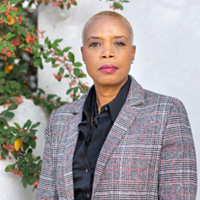Andrea Mays, Ph.D
Education:
- B.A. 1998 Communications, George Mason University
- M.A. 2004 Comparative Literature and Cultural Studies, University of New Mexico
- Ph.D. 2014 American Studies University of New Mexico
Why Africana Studies?
I believe the economic and political power relations of modern Global society have been foundationally shaped by the presence of peoples of African descent, their struggles, and their contributions. Though peoples living in the Black Diaspora have frequently been alienated from the nexus of state and economic power, our determination, political and intellectual genius, creative innovation, and political movements have written important chapters in nearly every geopolitical epoch. I am invested in revealing the ways our resistance to alienation and marginalization has compelled transformation across the Globe through expressive forms. Africana Studies seems to me the perfect interdisciplinary intellectual platform from which to launch my projects.Bio
Throughout my community experiences growing up on the Southside of Chicago, studies of politics and culture, and research and teaching in these areas for more than a decade, it’s been imminently clear that arrangements of power, constructed difference, and the creation of culture are not, and have never been, disinterested projects.Dr. Mays, is a Senior Lecturer in the Department of Africana Studies at the University of New Mexico. She has taught courses in the UNM Department of American Studies and the Women, Gender & Sexuality Studies Program. Her teaching and scholarship focus on African American and Black Atlantic Culture and Politics, Visual Culture Studies, and Black Feminist Studies. Her research interests include Black Atlantic expressions of critical and resistance politics in visual and literary culture. She teaches courses on Black Art, Black Feminism, Film, Literature, Afrofuturism, and the fiction of Octavia Butler.
Dr. Mays’ public scholarship includes essays and articles published in USA Today, The Albuquerque Journal, The Santa Fe Reporter, IKON Feminism Commemorative Digital Archive, Morgan State University Global Journalism Review, and the film Letters to Our Daughters directed by native New Mexican filmmaker Christopher Roybal, narrated by Dolores Huerta, Co-Founder and First Vice President Emeritus of the United Farm Workers of America, AFL-CIO. Mays has presented at regional and national conferences including the South West American/Popular Culture Conference (2003, 2018 & 2024), SAGE Health Summit (2015 & 2017), and The National Women Studies Association Annual Conference (2003 & 2006), The Rocky Mountain American Studies Association Conference (2006), Mujeres Activas en Letras y Cambio Social (MALCS) in 2007) and the National American Studies Annual Conference (2006, 2013, 2019, 2021 & 2024).
Mays’ forthcoming essays include Allan Rohan Crite Reporting from the Pantheon of American Racial Politics, which updates the art historical assessments of Crite and offers a nuanced reconceptualization of his artistic agency and resistance within early twentieth century American Scene Painting. In How to Recognize a Hostage Situation When You’re in It: The Politics of Blackness and Black Atlantic Being, Mays undertakes questions of Black peoples’ investments in nation-state politics, and the cost and limits, of these investments.
Fellowships
- Andrew W. Mellon Foundation Dissertation Fellowship
- Smithsonian Institution Toward Equity in Publishing Scholarship
- American Association of University Women, Santa Fe Chapter, Scholarship Recipient
Awards
- UNM College of Arts and Sciences Outstanding Lecturer of the Year Award
- Honoree, Leading by Being, Institute for the Love of Learning, Santa Fe, NM
- UNM Gunter Starkey Excellence in Teaching Award
- UNM Peer Mentors for Graduates of Color Faculty of Color Award
- UNM Provost General Education Teaching Fellow
- UNM African American Student Services Distinguished Service Award
- National Women’s Studies Association (Travel Grant)
- UNM Department of Foreign Languages and Literatures (Travel Grant)

